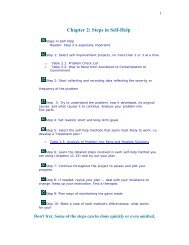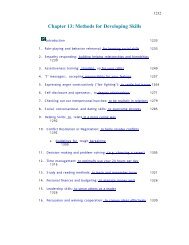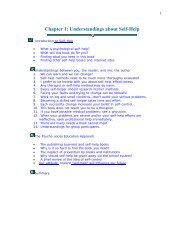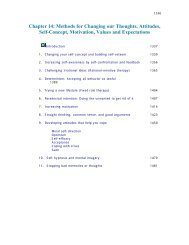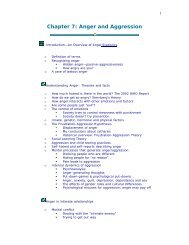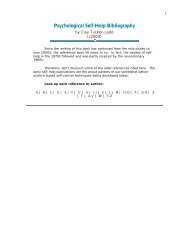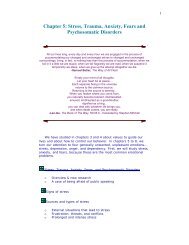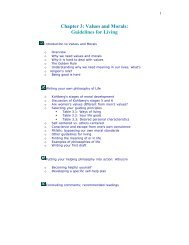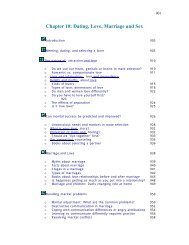Methods for Changing Behaviors - Psychological Self-Help
Methods for Changing Behaviors - Psychological Self-Help
Methods for Changing Behaviors - Psychological Self-Help
You also want an ePaper? Increase the reach of your titles
YUMPU automatically turns print PDFs into web optimized ePapers that Google loves.
the bars, but not all of them. It's still hard to go. Similarly, it is hard to<br />
seek out self-help groups, like a club <strong>for</strong> single parents, or a therapist.<br />
Although it's difficult, consider the consequences of not changing.<br />
STEP THREE: The substitute response may need to be practiced.<br />
Exactly what competing behavior you intend to use must be<br />
well thought out.<br />
The overriding response, say pressing your foot against the floor<br />
(so no one notices), to an urge to per<strong>for</strong>m a habit, such as anxiously<br />
bouncing your leg, may need to be done in front of a mirror until you<br />
look natural and can do other things, like talk, at the same time.<br />
Action designed to replace the bad habit must be so well planned and<br />
practiced, so it can be used immediately (be<strong>for</strong>e the unwanted habit<br />
occurs).<br />
STEP FOUR: Make the substitution at every opportunity.<br />
Every time you feel the slightest tendency or urge to do the old<br />
habit, per<strong>for</strong>m the new response. Be especially watchful when you are<br />
in the situation where the habit usually occurs, e.g. if you bite your<br />
nails while studying, be alert <strong>for</strong> the first tendency--say just touching<br />
your face--to bite the nails and immediately carry out your competing<br />
response which might be making your hands into a fist instead of<br />
extending your finger into your mouth.<br />
In many self-help projects to overcome a bad habit, it may be<br />
helpful <strong>for</strong> the person to continue the substitute behavior <strong>for</strong> a minute<br />
or two after it has overcome the unwanted urge. Try to stop the<br />
unwanted habit every time. Don't give up too quickly... habits do not<br />
die easily.<br />
Time involved<br />
Relatively little time ordinarily is involved in this simple method,<br />
just thinking of an alternative, practicing it, and assuring that you<br />
faithfully substitute the alternative behavior. On the other hand, don't<br />
expect quick results in every case. Often the unwanted habit decreases<br />
in a few days but it ain't dead yet. If you stop the habit reversal at<br />
that point, the old habit is likely to come back. Don't be surprised if it<br />
takes two or three months to truly conquer the old habit. Remember<br />
old habits may never die completely--millions of smokers have gone<br />
back to smoking weeks or months after "breaking the habit."<br />
Common problems with this method<br />
Sometimes the substitutes have unwanted consequences, e.g.<br />
eating instead of smoking may increase your weight (usually by only a<br />
few pounds--and that can be guarded against). Perhaps the most<br />
difficult aspect of this method involves the fact that many unwanted<br />
habits occur when we are occupied by some other activity...or when<br />
1109



